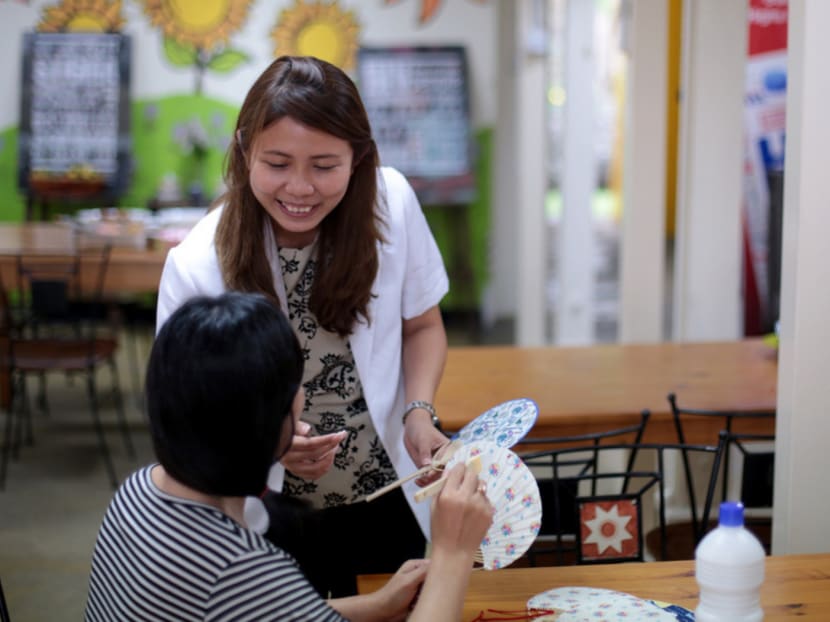Life is better now for HIV patients in S’pore
SINGAPORE — When Madam Alice (not her real name) was diagnosed with human immunodeficiency virus (HIV) five years ago, she started a self-imposed ban on sharing food and utensils with her only child.

The Patient Care Centre at TTSH is a community-based project that provides rehabilitation and support programmes to help people living with HIV reintegrate into society. Photo: Jason Quah
SINGAPORE — When Madam Alice (not her real name) was diagnosed with human immunodeficiency virus (HIV) five years ago, she started a self-imposed ban on sharing food and utensils with her only child.
Although the disease cannot be transmitted in this manner, the 45-year-old housewife said her own idea of the stigma and irrationality got the better of her.
HIV cannot be spread via social settings such as the sharing of food and utensils, hugging, and using the same toilet seats. According to the Centers for Disease Control and Prevention, only certain bodily fluids can transmit the virus: Blood, semen, pre-seminal fluid, vaginal secretions and breast milk. In Singapore, sexual transmission is the main way that HIV is spread.
Mdm Alice’s 18-year-old daughter is her only relative who knows about her HIV status. She has not disclosed her condition to other relatives for fear of discrimination after contracting the disease from her husband. He had a heart attack and died three years ago.
She said: “Even if I tell my friends and relatives, what can they do for me? I’m afraid people will look down on me or think I’m ‘dirty’ because of my illness.”
Social stigma and misconceptions about the disease mean that people living with HIV often bear the burden of the disease without adequate support.
SUPPORT FOR HIV PATIENTS
But Mdm Alice counts herself among the more fortunate ones. At the Patient Care Centre (PCC) within the Communicable Disease Centre at Tan Tock Seng Hospital (TTSH), she has picked up cooking, learnt to make handicrafts, and bonded with staff and volunteers, rebuilding her self-esteem along the way.
TTSH currently sees about 3,000 HIV-positive patients, including newly-diagnosed and follow-up cases, each year. The PCC is a community-based hospital project that provides rehabilitation and support programmes to help people living with HIV reintegrate into society.
Mdm Alice is one of the 20 HIV-positive patients under the centre’s Red Ribbon Project. They each get a monthly stipend of between S$400 and S$500 by making handicrafts or cooking lunches for staff. “Here, I feel appreciated when I see the staff enjoying the food I cook,” she said.
To raise awareness and de-stigmatise HIV, TTSH will be organising an event titled “I have HIV, will you eat with me?” on World AIDS Day next Tuesday at the hospital’s atrium, Level 1, from 10am to 4pm. Proceeds from the sale of food and handicrafts will go towards helping those who are HIV-positive.
Ms Swee Fong Juan, a research assistant at the Institute of Infectious Diseases and Epidemiology (IIDE), has her lunch at PCC whenever possible to show her support and acceptance for people living with HIV.
“Through the interactions, I learnt that people with HIV are really just like any of us. In fact I am inspired by their tenacity in life and now have a better understanding of the disease,” said Ms Swee, 27.
longer life expectancy
Last year, there were 456 new cases of HIV infection reported among Singapore residents, in line with figures in the last few years. This brings the total number of HIV-infected Singapore residents to 6,685 as of end-2014, of whom 1,737 have died.
Given the developments in today’s antiretroviral therapy, people with HIV on treatment are expected to live longer. A HIV-positive patient diagnosed in 2011 had a 93 per cent less risk of dying from the disease compared with a patient diagnosed in 1985 to 1998, according to an internal analysis conducted in April by TTSH.
In fact, with early detection and treatment, they can still work and contribute to society, said Associate Professor Lee Cheng Chuan, senior consultant and head of HIV Programme at TTSH’s IIDE.
Current medications used to treat HIV infection can drive the virus level in the blood to very low or undetectable when patients adhere to their medication regimen.
“At these levels, the person is rendered much less infectious and much less likely to transmit the virus to other people. The person’s immune system stays largely intact and he remains healthy for many years,” said Associate Prof Lee.
With HIV being a manageable chronic illness now, psychosocial support is equally important when it comes to treating a HIV-positive patient, added Ms Lin Jingyi, senior medical social worker at the Department of Care and Counselling at TTSH.
According to Ms Lin, studies show that HIV-positive patients with social support adhere better to their treatment and have a higher quality of life. Those who perceived stigma and feel unloved were likely to have poorer treatment adherence.
At TTSH, newly diagnosed patients are usually referred to a medical social worker, who also counsels and educates family members.
The hospital also runs a support group for its HIV patients.
Mdm Alice shared that her daughter’s understanding has played an important role in her HIV journey. She hopes that one day, society will accept people living with the disease.
She said: “Knowing I have HIV has not stopped my daughter from sharing food and drinks with me.
“She knows the disease cannot be passed from person to person in this manner. That makes me happy as her love and support are very important to me.”






